MGMT201: Management Accounting - Traditional Budgeting Practices
VerifiedAdded on 2022/11/13
|13
|3373
|406
Report
AI Summary
This report provides a comprehensive overview of traditional budgeting in management accounting within the context of the information age. It begins by introducing the concept of budgeting and its importance for organizational planning, control, and coordination. The report then explores the relevance of traditional budgeting in today's business environment, highlighting its role in financial planning, performance evaluation, and goal communication. A critical analysis of traditional budgeting is presented, discussing its limitations and potential drawbacks, such as the time-consuming nature and the potential for human errors. The report also examines budgeting practices in Australia, including capital budgeting techniques and the transparency of financial information. Finally, the report emphasizes the need to reframe traditional budgeting practices to address the complexities of the modern market environment, and the adoption of alternative approaches such as KPIs and rolling forecasts by some companies are discussed.
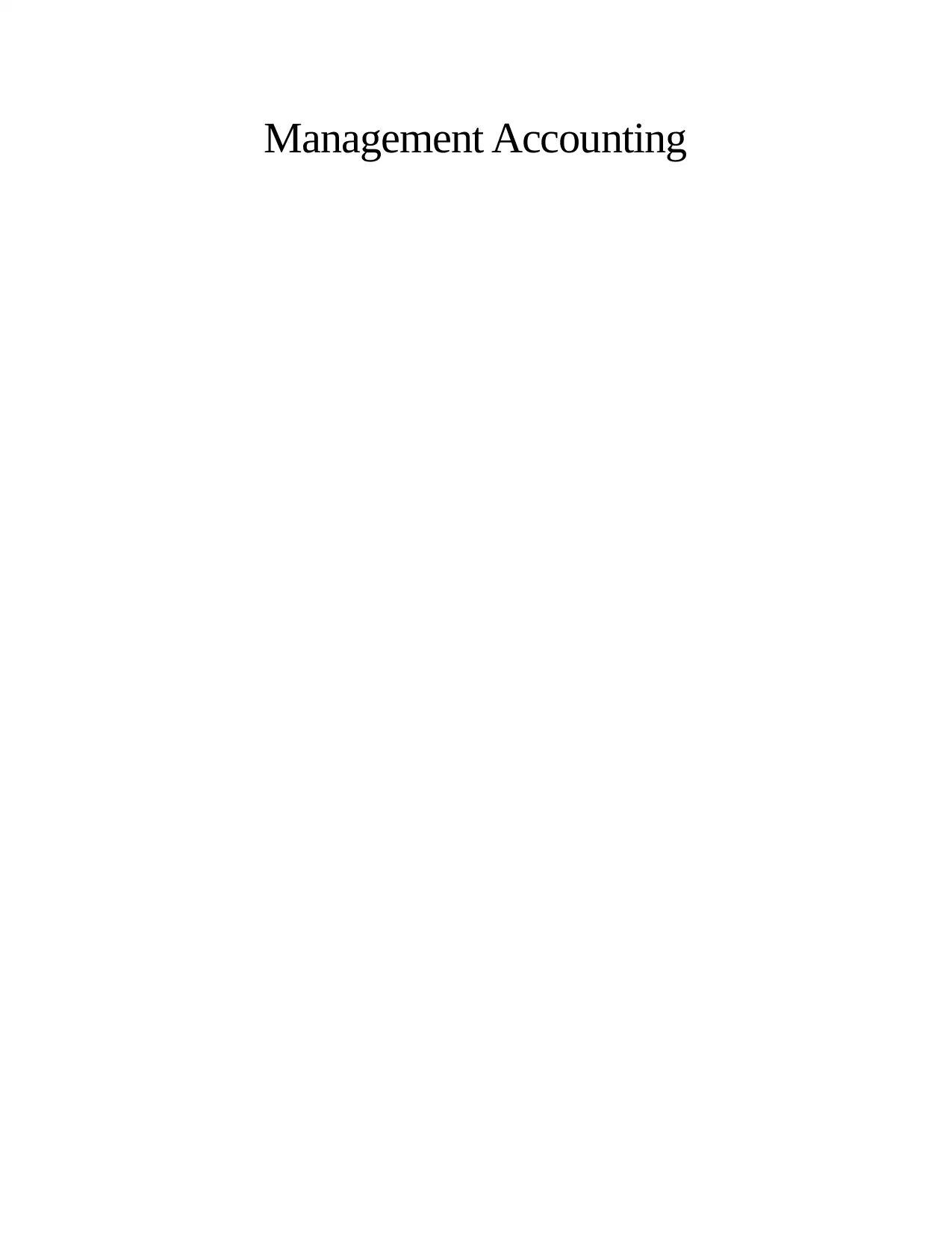
Management Accounting
Paraphrase This Document
Need a fresh take? Get an instant paraphrase of this document with our AI Paraphraser
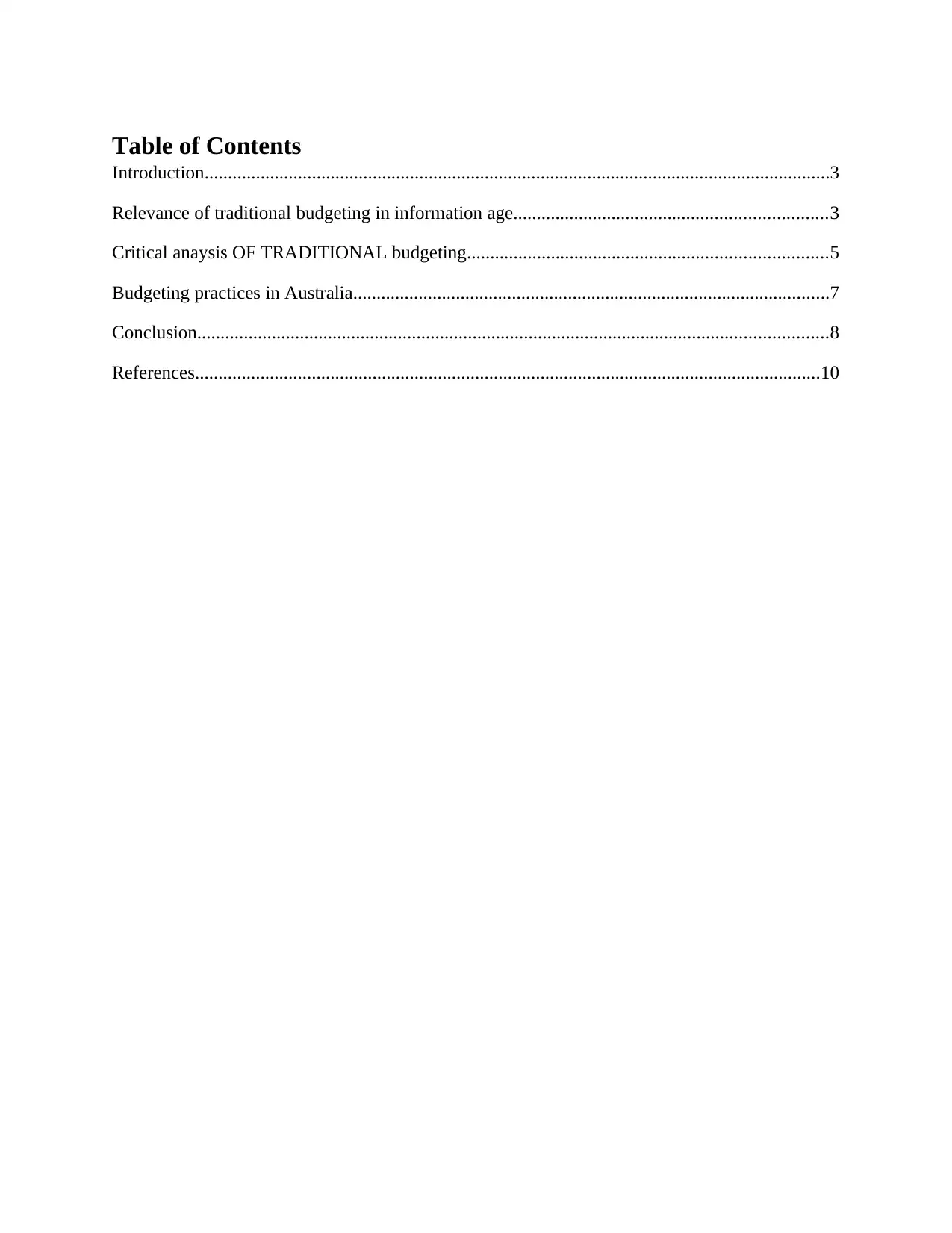
Table of Contents
Introduction......................................................................................................................................3
Relevance of traditional budgeting in information age...................................................................3
Critical anaysis OF TRADITIONAL budgeting.............................................................................5
Budgeting practices in Australia......................................................................................................7
Conclusion.......................................................................................................................................8
References......................................................................................................................................10
Introduction......................................................................................................................................3
Relevance of traditional budgeting in information age...................................................................3
Critical anaysis OF TRADITIONAL budgeting.............................................................................5
Budgeting practices in Australia......................................................................................................7
Conclusion.......................................................................................................................................8
References......................................................................................................................................10
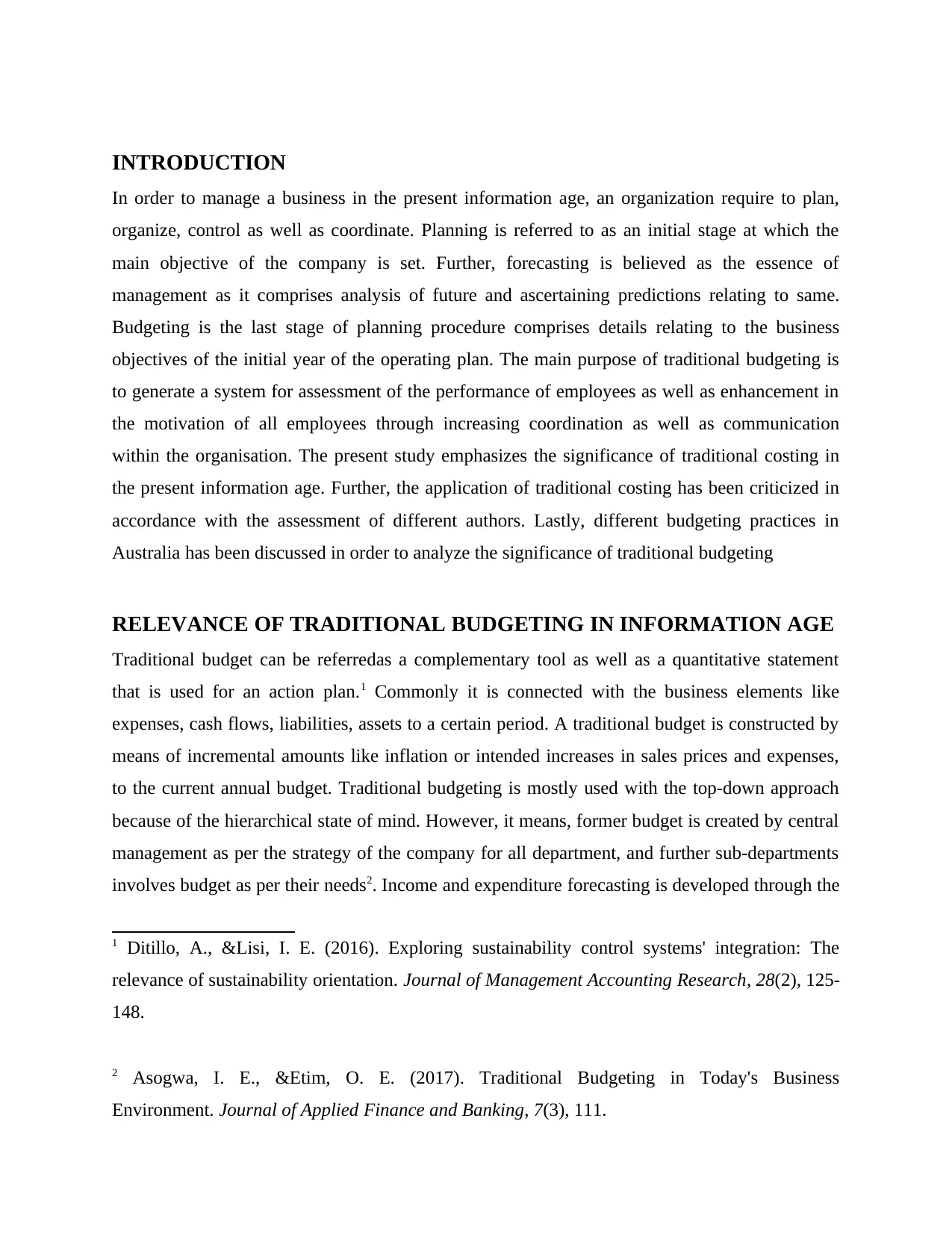
INTRODUCTION
In order to manage a business in the present information age, an organization require to plan,
organize, control as well as coordinate. Planning is referred to as an initial stage at which the
main objective of the company is set. Further, forecasting is believed as the essence of
management as it comprises analysis of future and ascertaining predictions relating to same.
Budgeting is the last stage of planning procedure comprises details relating to the business
objectives of the initial year of the operating plan. The main purpose of traditional budgeting is
to generate a system for assessment of the performance of employees as well as enhancement in
the motivation of all employees through increasing coordination as well as communication
within the organisation. The present study emphasizes the significance of traditional costing in
the present information age. Further, the application of traditional costing has been criticized in
accordance with the assessment of different authors. Lastly, different budgeting practices in
Australia has been discussed in order to analyze the significance of traditional budgeting
RELEVANCE OF TRADITIONAL BUDGETING IN INFORMATION AGE
Traditional budget can be referredas a complementary tool as well as a quantitative statement
that is used for an action plan.1 Commonly it is connected with the business elements like
expenses, cash flows, liabilities, assets to a certain period. A traditional budget is constructed by
means of incremental amounts like inflation or intended increases in sales prices and expenses,
to the current annual budget. Traditional budgeting is mostly used with the top-down approach
because of the hierarchical state of mind. However, it means, former budget is created by central
management as per the strategy of the company for all department, and further sub-departments
involves budget as per their needs2. Income and expenditure forecasting is developed through the
1 Ditillo, A., &Lisi, I. E. (2016). Exploring sustainability control systems' integration: The
relevance of sustainability orientation. Journal of Management Accounting Research, 28(2), 125-
148.
2 Asogwa, I. E., &Etim, O. E. (2017). Traditional Budgeting in Today's Business
Environment. Journal of Applied Finance and Banking, 7(3), 111.
In order to manage a business in the present information age, an organization require to plan,
organize, control as well as coordinate. Planning is referred to as an initial stage at which the
main objective of the company is set. Further, forecasting is believed as the essence of
management as it comprises analysis of future and ascertaining predictions relating to same.
Budgeting is the last stage of planning procedure comprises details relating to the business
objectives of the initial year of the operating plan. The main purpose of traditional budgeting is
to generate a system for assessment of the performance of employees as well as enhancement in
the motivation of all employees through increasing coordination as well as communication
within the organisation. The present study emphasizes the significance of traditional costing in
the present information age. Further, the application of traditional costing has been criticized in
accordance with the assessment of different authors. Lastly, different budgeting practices in
Australia has been discussed in order to analyze the significance of traditional budgeting
RELEVANCE OF TRADITIONAL BUDGETING IN INFORMATION AGE
Traditional budget can be referredas a complementary tool as well as a quantitative statement
that is used for an action plan.1 Commonly it is connected with the business elements like
expenses, cash flows, liabilities, assets to a certain period. A traditional budget is constructed by
means of incremental amounts like inflation or intended increases in sales prices and expenses,
to the current annual budget. Traditional budgeting is mostly used with the top-down approach
because of the hierarchical state of mind. However, it means, former budget is created by central
management as per the strategy of the company for all department, and further sub-departments
involves budget as per their needs2. Income and expenditure forecasting is developed through the
1 Ditillo, A., &Lisi, I. E. (2016). Exploring sustainability control systems' integration: The
relevance of sustainability orientation. Journal of Management Accounting Research, 28(2), 125-
148.
2 Asogwa, I. E., &Etim, O. E. (2017). Traditional Budgeting in Today's Business
Environment. Journal of Applied Finance and Banking, 7(3), 111.
⊘ This is a preview!⊘
Do you want full access?
Subscribe today to unlock all pages.

Trusted by 1+ million students worldwide
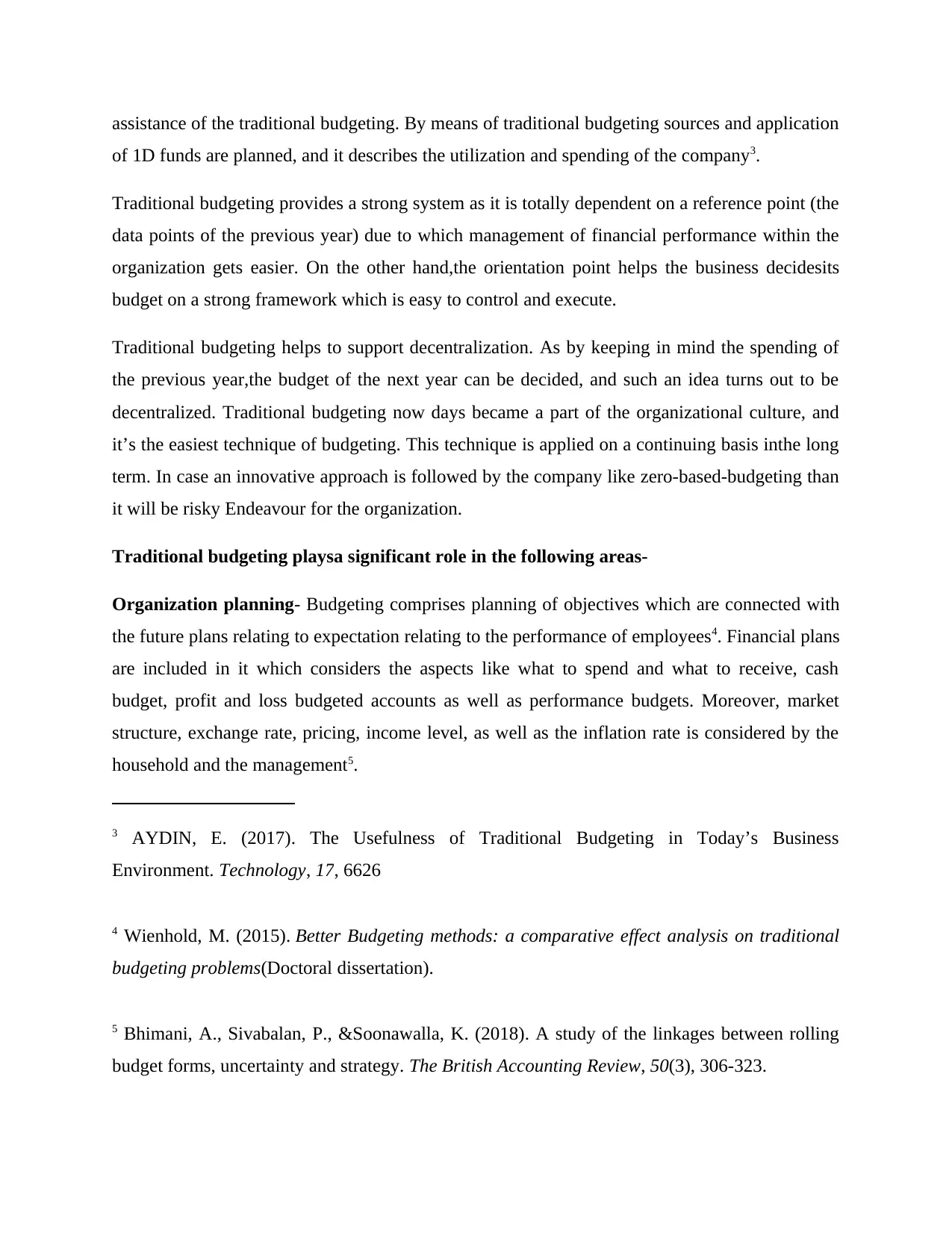
assistance of the traditional budgeting. By means of traditional budgeting sources and application
of 1D funds are planned, and it describes the utilization and spending of the company3.
Traditional budgeting provides a strong system as it is totally dependent on a reference point (the
data points of the previous year) due to which management of financial performance within the
organization gets easier. On the other hand,the orientation point helps the business decidesits
budget on a strong framework which is easy to control and execute.
Traditional budgeting helps to support decentralization. As by keeping in mind the spending of
the previous year,the budget of the next year can be decided, and such an idea turns out to be
decentralized. Traditional budgeting now days became a part of the organizational culture, and
it’s the easiest technique of budgeting. This technique is applied on a continuing basis inthe long
term. In case an innovative approach is followed by the company like zero-based-budgeting than
it will be risky Endeavour for the organization.
Traditional budgeting playsa significant role in the following areas-
Organization planning- Budgeting comprises planning of objectives which are connected with
the future plans relating to expectation relating to the performance of employees4. Financial plans
are included in it which considers the aspects like what to spend and what to receive, cash
budget, profit and loss budgeted accounts as well as performance budgets. Moreover, market
structure, exchange rate, pricing, income level, as well as the inflation rate is considered by the
household and the management5.
3 AYDIN, E. (2017). The Usefulness of Traditional Budgeting in Today’s Business
Environment. Technology, 17, 6626
4 Wienhold, M. (2015). Better Budgeting methods: a comparative effect analysis on traditional
budgeting problems(Doctoral dissertation).
5 Bhimani, A., Sivabalan, P., &Soonawalla, K. (2018). A study of the linkages between rolling
budget forms, uncertainty and strategy. The British Accounting Review, 50(3), 306-323.
of 1D funds are planned, and it describes the utilization and spending of the company3.
Traditional budgeting provides a strong system as it is totally dependent on a reference point (the
data points of the previous year) due to which management of financial performance within the
organization gets easier. On the other hand,the orientation point helps the business decidesits
budget on a strong framework which is easy to control and execute.
Traditional budgeting helps to support decentralization. As by keeping in mind the spending of
the previous year,the budget of the next year can be decided, and such an idea turns out to be
decentralized. Traditional budgeting now days became a part of the organizational culture, and
it’s the easiest technique of budgeting. This technique is applied on a continuing basis inthe long
term. In case an innovative approach is followed by the company like zero-based-budgeting than
it will be risky Endeavour for the organization.
Traditional budgeting playsa significant role in the following areas-
Organization planning- Budgeting comprises planning of objectives which are connected with
the future plans relating to expectation relating to the performance of employees4. Financial plans
are included in it which considers the aspects like what to spend and what to receive, cash
budget, profit and loss budgeted accounts as well as performance budgets. Moreover, market
structure, exchange rate, pricing, income level, as well as the inflation rate is considered by the
household and the management5.
3 AYDIN, E. (2017). The Usefulness of Traditional Budgeting in Today’s Business
Environment. Technology, 17, 6626
4 Wienhold, M. (2015). Better Budgeting methods: a comparative effect analysis on traditional
budgeting problems(Doctoral dissertation).
5 Bhimani, A., Sivabalan, P., &Soonawalla, K. (2018). A study of the linkages between rolling
budget forms, uncertainty and strategy. The British Accounting Review, 50(3), 306-323.
Paraphrase This Document
Need a fresh take? Get an instant paraphrase of this document with our AI Paraphraser
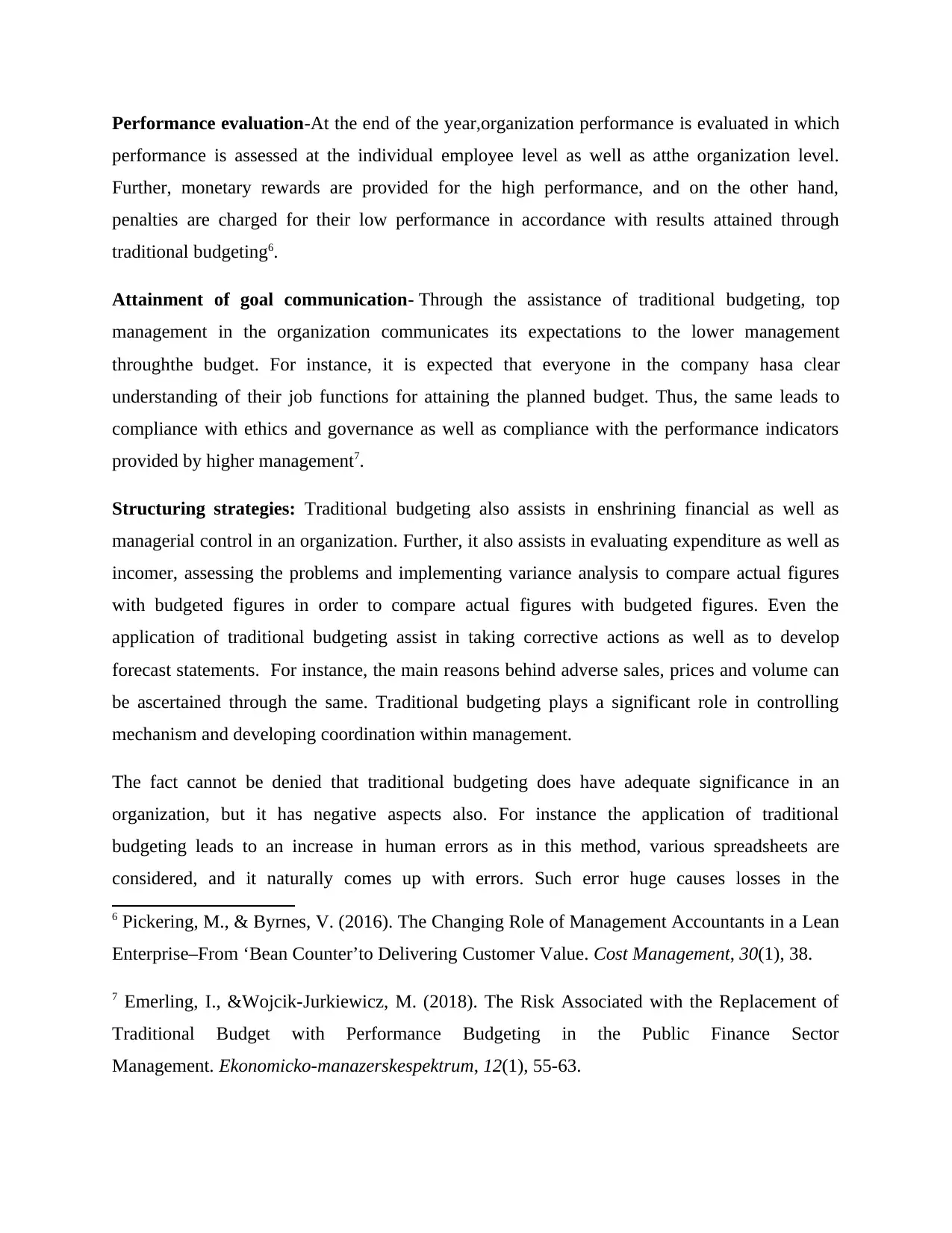
Performance evaluation-At the end of the year,organization performance is evaluated in which
performance is assessed at the individual employee level as well as atthe organization level.
Further, monetary rewards are provided for the high performance, and on the other hand,
penalties are charged for their low performance in accordance with results attained through
traditional budgeting6.
Attainment of goal communication- Through the assistance of traditional budgeting, top
management in the organization communicates its expectations to the lower management
throughthe budget. For instance, it is expected that everyone in the company hasa clear
understanding of their job functions for attaining the planned budget. Thus, the same leads to
compliance with ethics and governance as well as compliance with the performance indicators
provided by higher management7.
Structuring strategies: Traditional budgeting also assists in enshrining financial as well as
managerial control in an organization. Further, it also assists in evaluating expenditure as well as
incomer, assessing the problems and implementing variance analysis to compare actual figures
with budgeted figures in order to compare actual figures with budgeted figures. Even the
application of traditional budgeting assist in taking corrective actions as well as to develop
forecast statements. For instance, the main reasons behind adverse sales, prices and volume can
be ascertained through the same. Traditional budgeting plays a significant role in controlling
mechanism and developing coordination within management.
The fact cannot be denied that traditional budgeting does have adequate significance in an
organization, but it has negative aspects also. For instance the application of traditional
budgeting leads to an increase in human errors as in this method, various spreadsheets are
considered, and it naturally comes up with errors. Such error huge causes losses in the
6 Pickering, M., & Byrnes, V. (2016). The Changing Role of Management Accountants in a Lean
Enterprise–From ‘Bean Counter’to Delivering Customer Value. Cost Management, 30(1), 38.
7 Emerling, I., &Wojcik-Jurkiewicz, M. (2018). The Risk Associated with the Replacement of
Traditional Budget with Performance Budgeting in the Public Finance Sector
Management. Ekonomicko-manazerskespektrum, 12(1), 55-63.
performance is assessed at the individual employee level as well as atthe organization level.
Further, monetary rewards are provided for the high performance, and on the other hand,
penalties are charged for their low performance in accordance with results attained through
traditional budgeting6.
Attainment of goal communication- Through the assistance of traditional budgeting, top
management in the organization communicates its expectations to the lower management
throughthe budget. For instance, it is expected that everyone in the company hasa clear
understanding of their job functions for attaining the planned budget. Thus, the same leads to
compliance with ethics and governance as well as compliance with the performance indicators
provided by higher management7.
Structuring strategies: Traditional budgeting also assists in enshrining financial as well as
managerial control in an organization. Further, it also assists in evaluating expenditure as well as
incomer, assessing the problems and implementing variance analysis to compare actual figures
with budgeted figures in order to compare actual figures with budgeted figures. Even the
application of traditional budgeting assist in taking corrective actions as well as to develop
forecast statements. For instance, the main reasons behind adverse sales, prices and volume can
be ascertained through the same. Traditional budgeting plays a significant role in controlling
mechanism and developing coordination within management.
The fact cannot be denied that traditional budgeting does have adequate significance in an
organization, but it has negative aspects also. For instance the application of traditional
budgeting leads to an increase in human errors as in this method, various spreadsheets are
considered, and it naturally comes up with errors. Such error huge causes losses in the
6 Pickering, M., & Byrnes, V. (2016). The Changing Role of Management Accountants in a Lean
Enterprise–From ‘Bean Counter’to Delivering Customer Value. Cost Management, 30(1), 38.
7 Emerling, I., &Wojcik-Jurkiewicz, M. (2018). The Risk Associated with the Replacement of
Traditional Budget with Performance Budgeting in the Public Finance Sector
Management. Ekonomicko-manazerskespektrum, 12(1), 55-63.
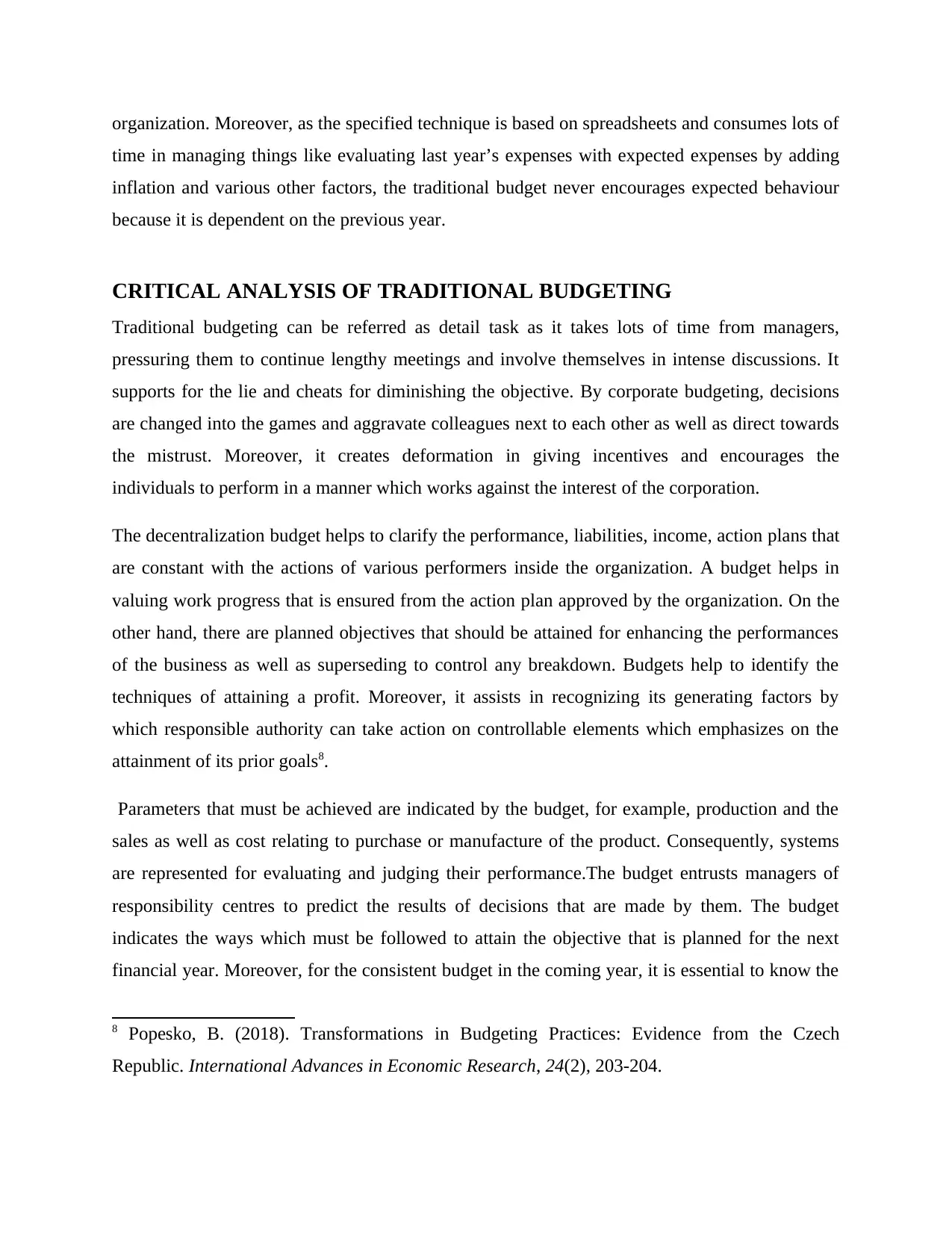
organization. Moreover, as the specified technique is based on spreadsheets and consumes lots of
time in managing things like evaluating last year’s expenses with expected expenses by adding
inflation and various other factors, the traditional budget never encourages expected behaviour
because it is dependent on the previous year.
CRITICAL ANALYSIS OF TRADITIONAL BUDGETING
Traditional budgeting can be referred as detail task as it takes lots of time from managers,
pressuring them to continue lengthy meetings and involve themselves in intense discussions. It
supports for the lie and cheats for diminishing the objective. By corporate budgeting, decisions
are changed into the games and aggravate colleagues next to each other as well as direct towards
the mistrust. Moreover, it creates deformation in giving incentives and encourages the
individuals to perform in a manner which works against the interest of the corporation.
The decentralization budget helps to clarify the performance, liabilities, income, action plans that
are constant with the actions of various performers inside the organization. A budget helps in
valuing work progress that is ensured from the action plan approved by the organization. On the
other hand, there are planned objectives that should be attained for enhancing the performances
of the business as well as superseding to control any breakdown. Budgets help to identify the
techniques of attaining a profit. Moreover, it assists in recognizing its generating factors by
which responsible authority can take action on controllable elements which emphasizes on the
attainment of its prior goals8.
Parameters that must be achieved are indicated by the budget, for example, production and the
sales as well as cost relating to purchase or manufacture of the product. Consequently, systems
are represented for evaluating and judging their performance.The budget entrusts managers of
responsibility centres to predict the results of decisions that are made by them. The budget
indicates the ways which must be followed to attain the objective that is planned for the next
financial year. Moreover, for the consistent budget in the coming year, it is essential to know the
8 Popesko, B. (2018). Transformations in Budgeting Practices: Evidence from the Czech
Republic. International Advances in Economic Research, 24(2), 203-204.
time in managing things like evaluating last year’s expenses with expected expenses by adding
inflation and various other factors, the traditional budget never encourages expected behaviour
because it is dependent on the previous year.
CRITICAL ANALYSIS OF TRADITIONAL BUDGETING
Traditional budgeting can be referred as detail task as it takes lots of time from managers,
pressuring them to continue lengthy meetings and involve themselves in intense discussions. It
supports for the lie and cheats for diminishing the objective. By corporate budgeting, decisions
are changed into the games and aggravate colleagues next to each other as well as direct towards
the mistrust. Moreover, it creates deformation in giving incentives and encourages the
individuals to perform in a manner which works against the interest of the corporation.
The decentralization budget helps to clarify the performance, liabilities, income, action plans that
are constant with the actions of various performers inside the organization. A budget helps in
valuing work progress that is ensured from the action plan approved by the organization. On the
other hand, there are planned objectives that should be attained for enhancing the performances
of the business as well as superseding to control any breakdown. Budgets help to identify the
techniques of attaining a profit. Moreover, it assists in recognizing its generating factors by
which responsible authority can take action on controllable elements which emphasizes on the
attainment of its prior goals8.
Parameters that must be achieved are indicated by the budget, for example, production and the
sales as well as cost relating to purchase or manufacture of the product. Consequently, systems
are represented for evaluating and judging their performance.The budget entrusts managers of
responsibility centres to predict the results of decisions that are made by them. The budget
indicates the ways which must be followed to attain the objective that is planned for the next
financial year. Moreover, for the consistent budget in the coming year, it is essential to know the
8 Popesko, B. (2018). Transformations in Budgeting Practices: Evidence from the Czech
Republic. International Advances in Economic Research, 24(2), 203-204.
⊘ This is a preview!⊘
Do you want full access?
Subscribe today to unlock all pages.

Trusted by 1+ million students worldwide
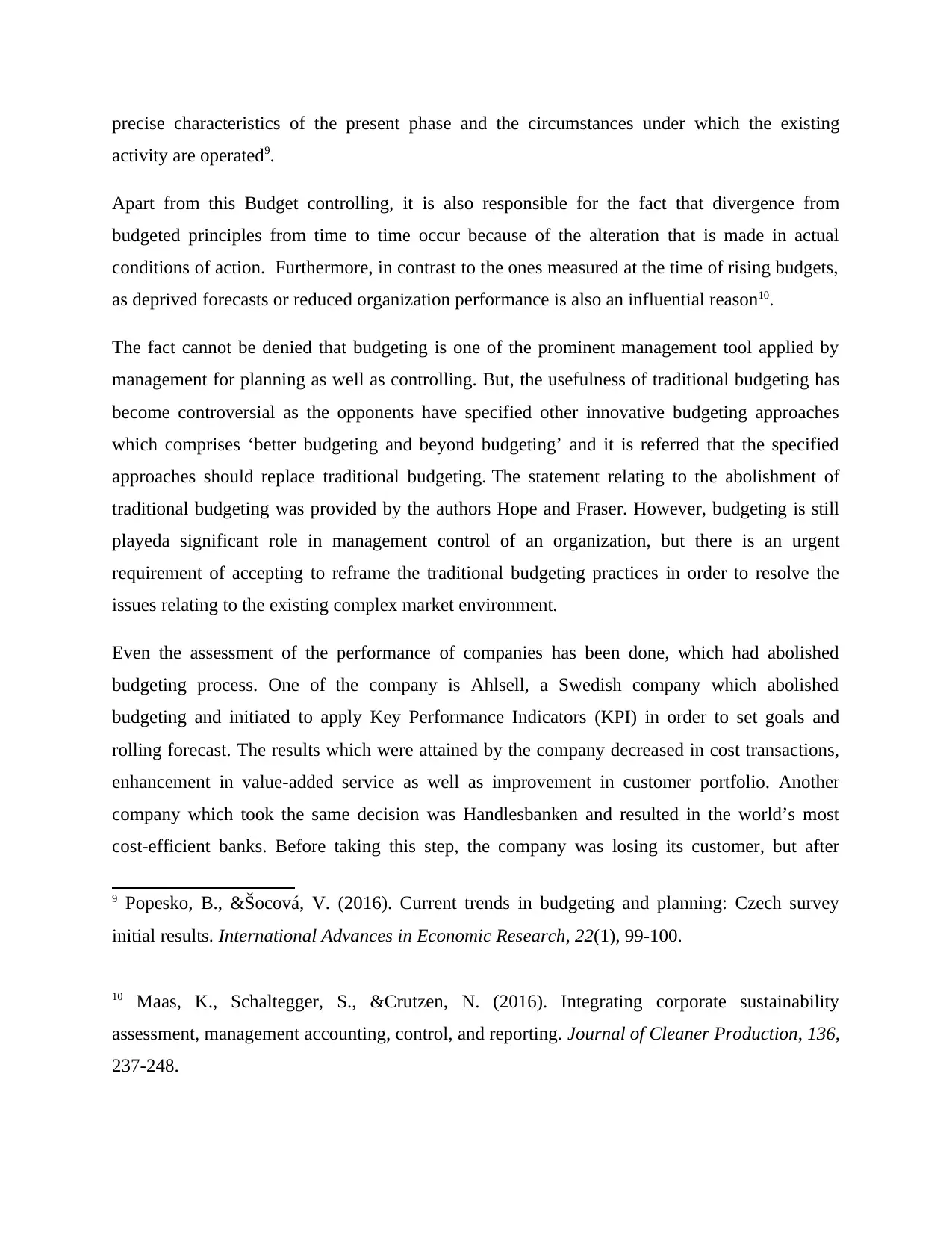
precise characteristics of the present phase and the circumstances under which the existing
activity are operated9.
Apart from this Budget controlling, it is also responsible for the fact that divergence from
budgeted principles from time to time occur because of the alteration that is made in actual
conditions of action. Furthermore, in contrast to the ones measured at the time of rising budgets,
as deprived forecasts or reduced organization performance is also an influential reason10.
The fact cannot be denied that budgeting is one of the prominent management tool applied by
management for planning as well as controlling. But, the usefulness of traditional budgeting has
become controversial as the opponents have specified other innovative budgeting approaches
which comprises ‘better budgeting and beyond budgeting’ and it is referred that the specified
approaches should replace traditional budgeting. The statement relating to the abolishment of
traditional budgeting was provided by the authors Hope and Fraser. However, budgeting is still
playeda significant role in management control of an organization, but there is an urgent
requirement of accepting to reframe the traditional budgeting practices in order to resolve the
issues relating to the existing complex market environment.
Even the assessment of the performance of companies has been done, which had abolished
budgeting process. One of the company is Ahlsell, a Swedish company which abolished
budgeting and initiated to apply Key Performance Indicators (KPI) in order to set goals and
rolling forecast. The results which were attained by the company decreased in cost transactions,
enhancement in value-added service as well as improvement in customer portfolio. Another
company which took the same decision was Handlesbanken and resulted in the world’s most
cost-efficient banks. Before taking this step, the company was losing its customer, but after
9 Popesko, B., &Šocová, V. (2016). Current trends in budgeting and planning: Czech survey
initial results. International Advances in Economic Research, 22(1), 99-100.
10 Maas, K., Schaltegger, S., &Crutzen, N. (2016). Integrating corporate sustainability
assessment, management accounting, control, and reporting. Journal of Cleaner Production, 136,
237-248.
activity are operated9.
Apart from this Budget controlling, it is also responsible for the fact that divergence from
budgeted principles from time to time occur because of the alteration that is made in actual
conditions of action. Furthermore, in contrast to the ones measured at the time of rising budgets,
as deprived forecasts or reduced organization performance is also an influential reason10.
The fact cannot be denied that budgeting is one of the prominent management tool applied by
management for planning as well as controlling. But, the usefulness of traditional budgeting has
become controversial as the opponents have specified other innovative budgeting approaches
which comprises ‘better budgeting and beyond budgeting’ and it is referred that the specified
approaches should replace traditional budgeting. The statement relating to the abolishment of
traditional budgeting was provided by the authors Hope and Fraser. However, budgeting is still
playeda significant role in management control of an organization, but there is an urgent
requirement of accepting to reframe the traditional budgeting practices in order to resolve the
issues relating to the existing complex market environment.
Even the assessment of the performance of companies has been done, which had abolished
budgeting process. One of the company is Ahlsell, a Swedish company which abolished
budgeting and initiated to apply Key Performance Indicators (KPI) in order to set goals and
rolling forecast. The results which were attained by the company decreased in cost transactions,
enhancement in value-added service as well as improvement in customer portfolio. Another
company which took the same decision was Handlesbanken and resulted in the world’s most
cost-efficient banks. Before taking this step, the company was losing its customer, but after
9 Popesko, B., &Šocová, V. (2016). Current trends in budgeting and planning: Czech survey
initial results. International Advances in Economic Research, 22(1), 99-100.
10 Maas, K., Schaltegger, S., &Crutzen, N. (2016). Integrating corporate sustainability
assessment, management accounting, control, and reporting. Journal of Cleaner Production, 136,
237-248.
Paraphrase This Document
Need a fresh take? Get an instant paraphrase of this document with our AI Paraphraser
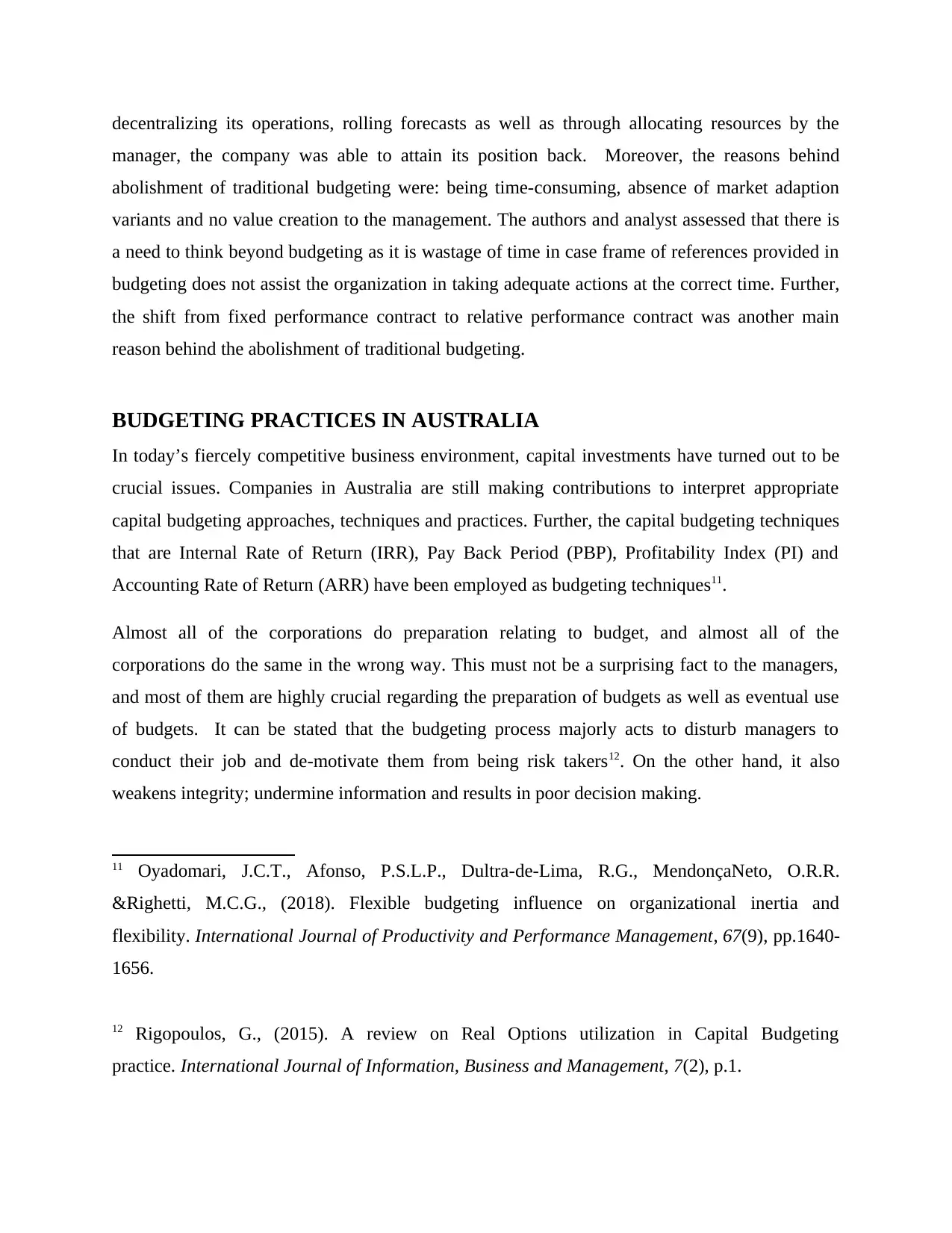
decentralizing its operations, rolling forecasts as well as through allocating resources by the
manager, the company was able to attain its position back. Moreover, the reasons behind
abolishment of traditional budgeting were: being time-consuming, absence of market adaption
variants and no value creation to the management. The authors and analyst assessed that there is
a need to think beyond budgeting as it is wastage of time in case frame of references provided in
budgeting does not assist the organization in taking adequate actions at the correct time. Further,
the shift from fixed performance contract to relative performance contract was another main
reason behind the abolishment of traditional budgeting.
BUDGETING PRACTICES IN AUSTRALIA
In today’s fiercely competitive business environment, capital investments have turned out to be
crucial issues. Companies in Australia are still making contributions to interpret appropriate
capital budgeting approaches, techniques and practices. Further, the capital budgeting techniques
that are Internal Rate of Return (IRR), Pay Back Period (PBP), Profitability Index (PI) and
Accounting Rate of Return (ARR) have been employed as budgeting techniques11.
Almost all of the corporations do preparation relating to budget, and almost all of the
corporations do the same in the wrong way. This must not be a surprising fact to the managers,
and most of them are highly crucial regarding the preparation of budgets as well as eventual use
of budgets. It can be stated that the budgeting process majorly acts to disturb managers to
conduct their job and de-motivate them from being risk takers12. On the other hand, it also
weakens integrity; undermine information and results in poor decision making.
11 Oyadomari, J.C.T., Afonso, P.S.L.P., Dultra-de-Lima, R.G., MendonçaNeto, O.R.R.
&Righetti, M.C.G., (2018). Flexible budgeting influence on organizational inertia and
flexibility. International Journal of Productivity and Performance Management, 67(9), pp.1640-
1656.
12 Rigopoulos, G., (2015). A review on Real Options utilization in Capital Budgeting
practice. International Journal of Information, Business and Management, 7(2), p.1.
manager, the company was able to attain its position back. Moreover, the reasons behind
abolishment of traditional budgeting were: being time-consuming, absence of market adaption
variants and no value creation to the management. The authors and analyst assessed that there is
a need to think beyond budgeting as it is wastage of time in case frame of references provided in
budgeting does not assist the organization in taking adequate actions at the correct time. Further,
the shift from fixed performance contract to relative performance contract was another main
reason behind the abolishment of traditional budgeting.
BUDGETING PRACTICES IN AUSTRALIA
In today’s fiercely competitive business environment, capital investments have turned out to be
crucial issues. Companies in Australia are still making contributions to interpret appropriate
capital budgeting approaches, techniques and practices. Further, the capital budgeting techniques
that are Internal Rate of Return (IRR), Pay Back Period (PBP), Profitability Index (PI) and
Accounting Rate of Return (ARR) have been employed as budgeting techniques11.
Almost all of the corporations do preparation relating to budget, and almost all of the
corporations do the same in the wrong way. This must not be a surprising fact to the managers,
and most of them are highly crucial regarding the preparation of budgets as well as eventual use
of budgets. It can be stated that the budgeting process majorly acts to disturb managers to
conduct their job and de-motivate them from being risk takers12. On the other hand, it also
weakens integrity; undermine information and results in poor decision making.
11 Oyadomari, J.C.T., Afonso, P.S.L.P., Dultra-de-Lima, R.G., MendonçaNeto, O.R.R.
&Righetti, M.C.G., (2018). Flexible budgeting influence on organizational inertia and
flexibility. International Journal of Productivity and Performance Management, 67(9), pp.1640-
1656.
12 Rigopoulos, G., (2015). A review on Real Options utilization in Capital Budgeting
practice. International Journal of Information, Business and Management, 7(2), p.1.
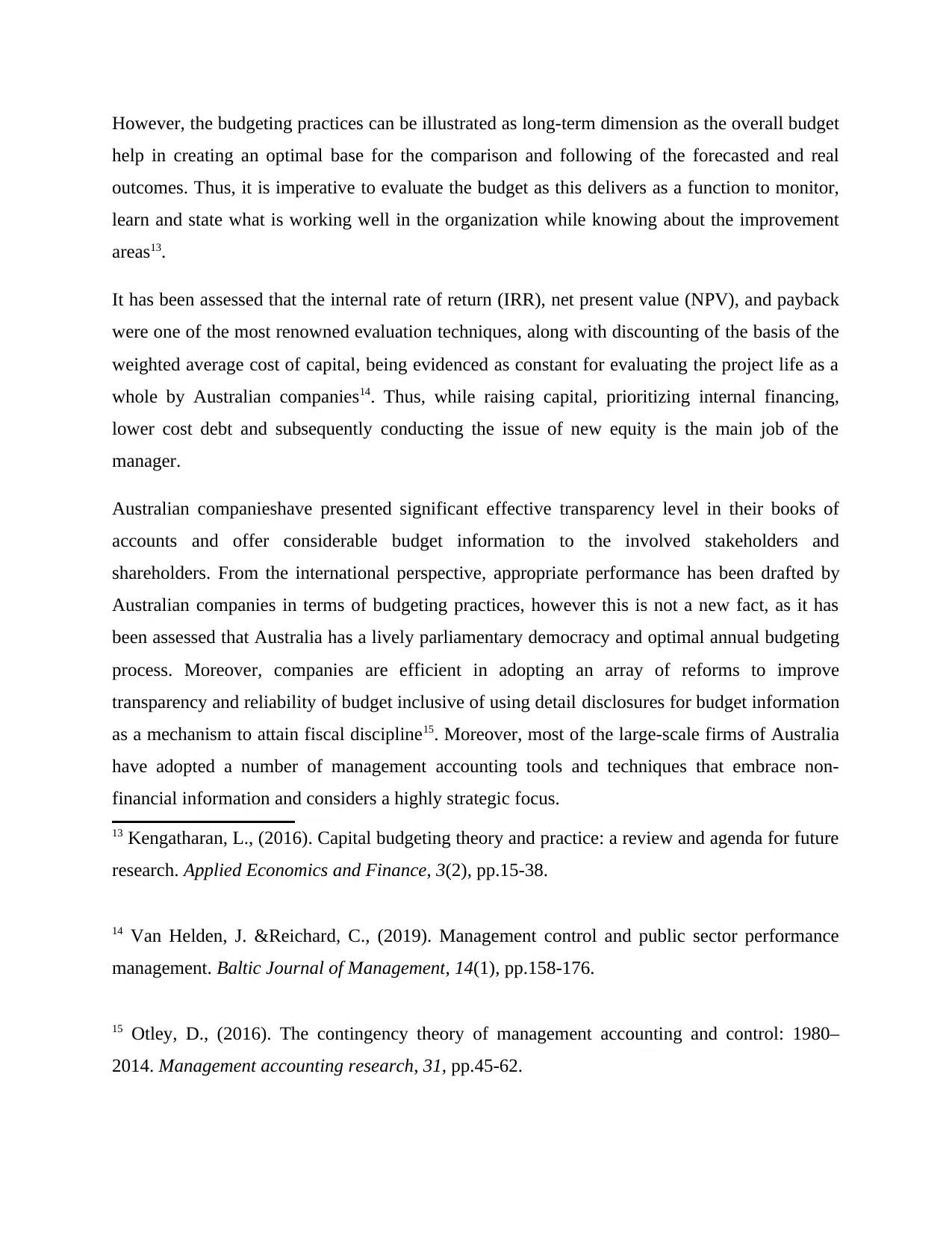
However, the budgeting practices can be illustrated as long-term dimension as the overall budget
help in creating an optimal base for the comparison and following of the forecasted and real
outcomes. Thus, it is imperative to evaluate the budget as this delivers as a function to monitor,
learn and state what is working well in the organization while knowing about the improvement
areas13.
It has been assessed that the internal rate of return (IRR), net present value (NPV), and payback
were one of the most renowned evaluation techniques, along with discounting of the basis of the
weighted average cost of capital, being evidenced as constant for evaluating the project life as a
whole by Australian companies14. Thus, while raising capital, prioritizing internal financing,
lower cost debt and subsequently conducting the issue of new equity is the main job of the
manager.
Australian companieshave presented significant effective transparency level in their books of
accounts and offer considerable budget information to the involved stakeholders and
shareholders. From the international perspective, appropriate performance has been drafted by
Australian companies in terms of budgeting practices, however this is not a new fact, as it has
been assessed that Australia has a lively parliamentary democracy and optimal annual budgeting
process. Moreover, companies are efficient in adopting an array of reforms to improve
transparency and reliability of budget inclusive of using detail disclosures for budget information
as a mechanism to attain fiscal discipline15. Moreover, most of the large-scale firms of Australia
have adopted a number of management accounting tools and techniques that embrace non-
financial information and considers a highly strategic focus.
13 Kengatharan, L., (2016). Capital budgeting theory and practice: a review and agenda for future
research. Applied Economics and Finance, 3(2), pp.15-38.
14 Van Helden, J. &Reichard, C., (2019). Management control and public sector performance
management. Baltic Journal of Management, 14(1), pp.158-176.
15 Otley, D., (2016). The contingency theory of management accounting and control: 1980–
2014. Management accounting research, 31, pp.45-62.
help in creating an optimal base for the comparison and following of the forecasted and real
outcomes. Thus, it is imperative to evaluate the budget as this delivers as a function to monitor,
learn and state what is working well in the organization while knowing about the improvement
areas13.
It has been assessed that the internal rate of return (IRR), net present value (NPV), and payback
were one of the most renowned evaluation techniques, along with discounting of the basis of the
weighted average cost of capital, being evidenced as constant for evaluating the project life as a
whole by Australian companies14. Thus, while raising capital, prioritizing internal financing,
lower cost debt and subsequently conducting the issue of new equity is the main job of the
manager.
Australian companieshave presented significant effective transparency level in their books of
accounts and offer considerable budget information to the involved stakeholders and
shareholders. From the international perspective, appropriate performance has been drafted by
Australian companies in terms of budgeting practices, however this is not a new fact, as it has
been assessed that Australia has a lively parliamentary democracy and optimal annual budgeting
process. Moreover, companies are efficient in adopting an array of reforms to improve
transparency and reliability of budget inclusive of using detail disclosures for budget information
as a mechanism to attain fiscal discipline15. Moreover, most of the large-scale firms of Australia
have adopted a number of management accounting tools and techniques that embrace non-
financial information and considers a highly strategic focus.
13 Kengatharan, L., (2016). Capital budgeting theory and practice: a review and agenda for future
research. Applied Economics and Finance, 3(2), pp.15-38.
14 Van Helden, J. &Reichard, C., (2019). Management control and public sector performance
management. Baltic Journal of Management, 14(1), pp.158-176.
15 Otley, D., (2016). The contingency theory of management accounting and control: 1980–
2014. Management accounting research, 31, pp.45-62.
⊘ This is a preview!⊘
Do you want full access?
Subscribe today to unlock all pages.

Trusted by 1+ million students worldwide
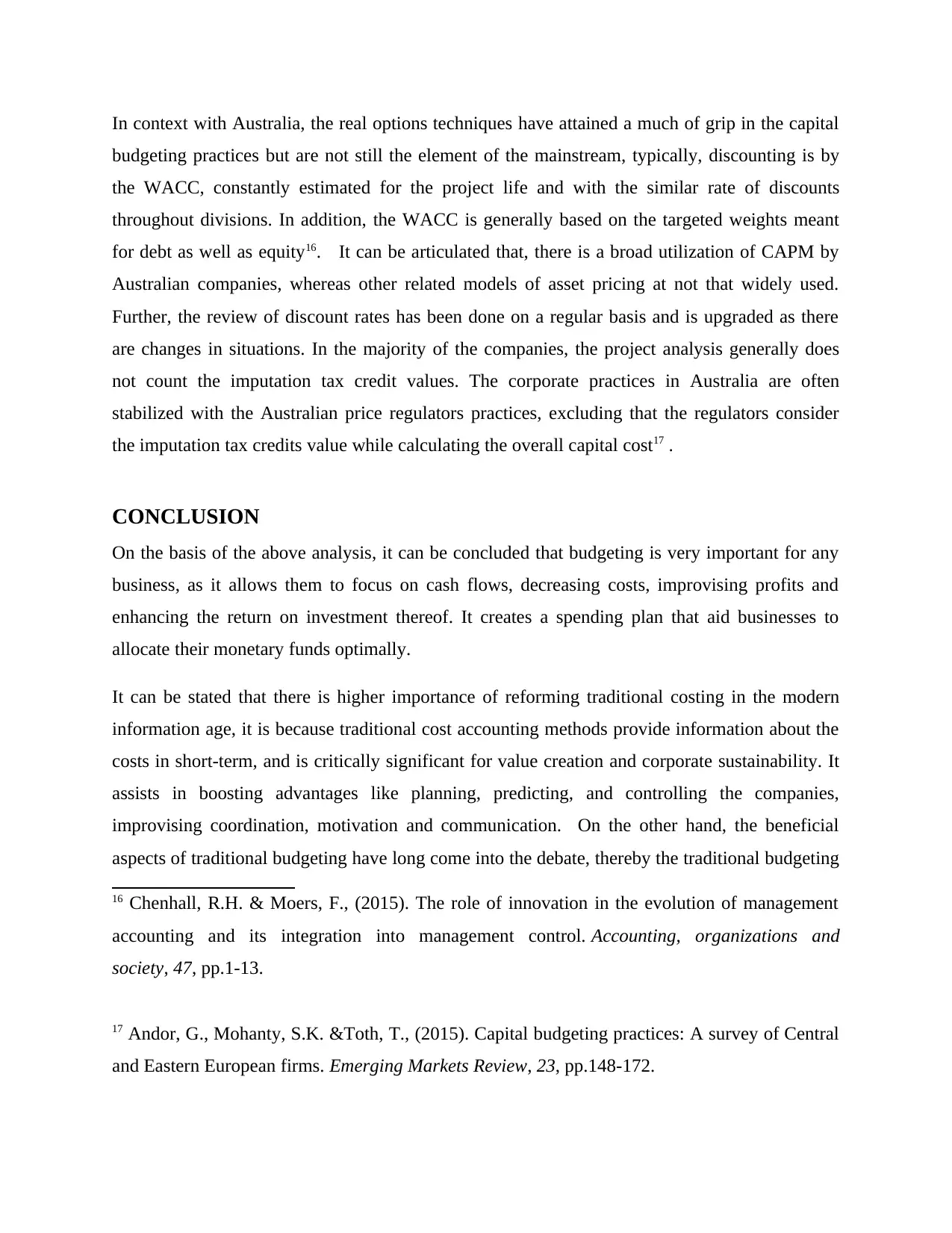
In context with Australia, the real options techniques have attained a much of grip in the capital
budgeting practices but are not still the element of the mainstream, typically, discounting is by
the WACC, constantly estimated for the project life and with the similar rate of discounts
throughout divisions. In addition, the WACC is generally based on the targeted weights meant
for debt as well as equity16. It can be articulated that, there is a broad utilization of CAPM by
Australian companies, whereas other related models of asset pricing at not that widely used.
Further, the review of discount rates has been done on a regular basis and is upgraded as there
are changes in situations. In the majority of the companies, the project analysis generally does
not count the imputation tax credit values. The corporate practices in Australia are often
stabilized with the Australian price regulators practices, excluding that the regulators consider
the imputation tax credits value while calculating the overall capital cost17 .
CONCLUSION
On the basis of the above analysis, it can be concluded that budgeting is very important for any
business, as it allows them to focus on cash flows, decreasing costs, improvising profits and
enhancing the return on investment thereof. It creates a spending plan that aid businesses to
allocate their monetary funds optimally.
It can be stated that there is higher importance of reforming traditional costing in the modern
information age, it is because traditional cost accounting methods provide information about the
costs in short-term, and is critically significant for value creation and corporate sustainability. It
assists in boosting advantages like planning, predicting, and controlling the companies,
improvising coordination, motivation and communication. On the other hand, the beneficial
aspects of traditional budgeting have long come into the debate, thereby the traditional budgeting
16 Chenhall, R.H. & Moers, F., (2015). The role of innovation in the evolution of management
accounting and its integration into management control. Accounting, organizations and
society, 47, pp.1-13.
17 Andor, G., Mohanty, S.K. &Toth, T., (2015). Capital budgeting practices: A survey of Central
and Eastern European firms. Emerging Markets Review, 23, pp.148-172.
budgeting practices but are not still the element of the mainstream, typically, discounting is by
the WACC, constantly estimated for the project life and with the similar rate of discounts
throughout divisions. In addition, the WACC is generally based on the targeted weights meant
for debt as well as equity16. It can be articulated that, there is a broad utilization of CAPM by
Australian companies, whereas other related models of asset pricing at not that widely used.
Further, the review of discount rates has been done on a regular basis and is upgraded as there
are changes in situations. In the majority of the companies, the project analysis generally does
not count the imputation tax credit values. The corporate practices in Australia are often
stabilized with the Australian price regulators practices, excluding that the regulators consider
the imputation tax credits value while calculating the overall capital cost17 .
CONCLUSION
On the basis of the above analysis, it can be concluded that budgeting is very important for any
business, as it allows them to focus on cash flows, decreasing costs, improvising profits and
enhancing the return on investment thereof. It creates a spending plan that aid businesses to
allocate their monetary funds optimally.
It can be stated that there is higher importance of reforming traditional costing in the modern
information age, it is because traditional cost accounting methods provide information about the
costs in short-term, and is critically significant for value creation and corporate sustainability. It
assists in boosting advantages like planning, predicting, and controlling the companies,
improvising coordination, motivation and communication. On the other hand, the beneficial
aspects of traditional budgeting have long come into the debate, thereby the traditional budgeting
16 Chenhall, R.H. & Moers, F., (2015). The role of innovation in the evolution of management
accounting and its integration into management control. Accounting, organizations and
society, 47, pp.1-13.
17 Andor, G., Mohanty, S.K. &Toth, T., (2015). Capital budgeting practices: A survey of Central
and Eastern European firms. Emerging Markets Review, 23, pp.148-172.
Paraphrase This Document
Need a fresh take? Get an instant paraphrase of this document with our AI Paraphraser
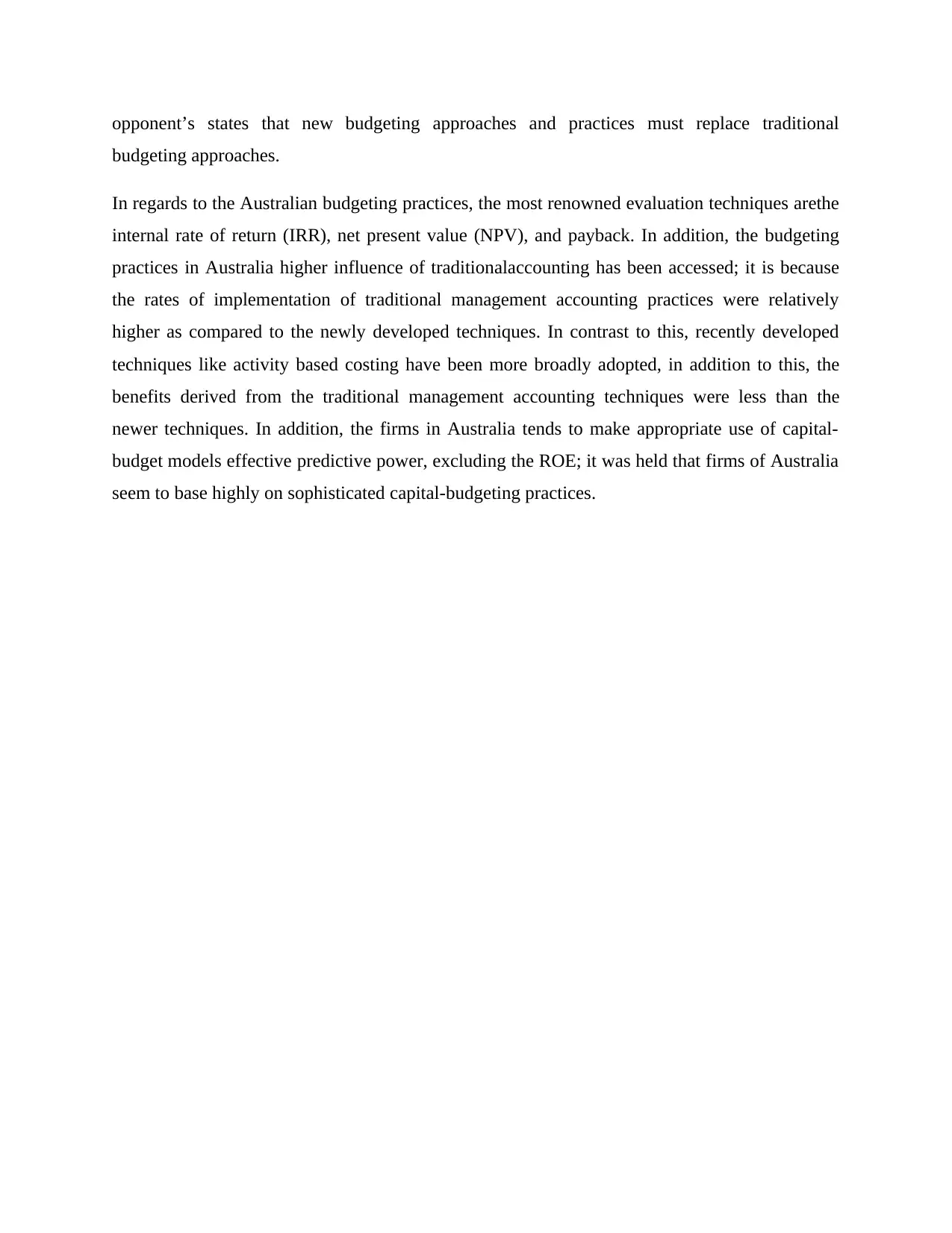
opponent’s states that new budgeting approaches and practices must replace traditional
budgeting approaches.
In regards to the Australian budgeting practices, the most renowned evaluation techniques arethe
internal rate of return (IRR), net present value (NPV), and payback. In addition, the budgeting
practices in Australia higher influence of traditionalaccounting has been accessed; it is because
the rates of implementation of traditional management accounting practices were relatively
higher as compared to the newly developed techniques. In contrast to this, recently developed
techniques like activity based costing have been more broadly adopted, in addition to this, the
benefits derived from the traditional management accounting techniques were less than the
newer techniques. In addition, the firms in Australia tends to make appropriate use of capital-
budget models effective predictive power, excluding the ROE; it was held that firms of Australia
seem to base highly on sophisticated capital-budgeting practices.
budgeting approaches.
In regards to the Australian budgeting practices, the most renowned evaluation techniques arethe
internal rate of return (IRR), net present value (NPV), and payback. In addition, the budgeting
practices in Australia higher influence of traditionalaccounting has been accessed; it is because
the rates of implementation of traditional management accounting practices were relatively
higher as compared to the newly developed techniques. In contrast to this, recently developed
techniques like activity based costing have been more broadly adopted, in addition to this, the
benefits derived from the traditional management accounting techniques were less than the
newer techniques. In addition, the firms in Australia tends to make appropriate use of capital-
budget models effective predictive power, excluding the ROE; it was held that firms of Australia
seem to base highly on sophisticated capital-budgeting practices.
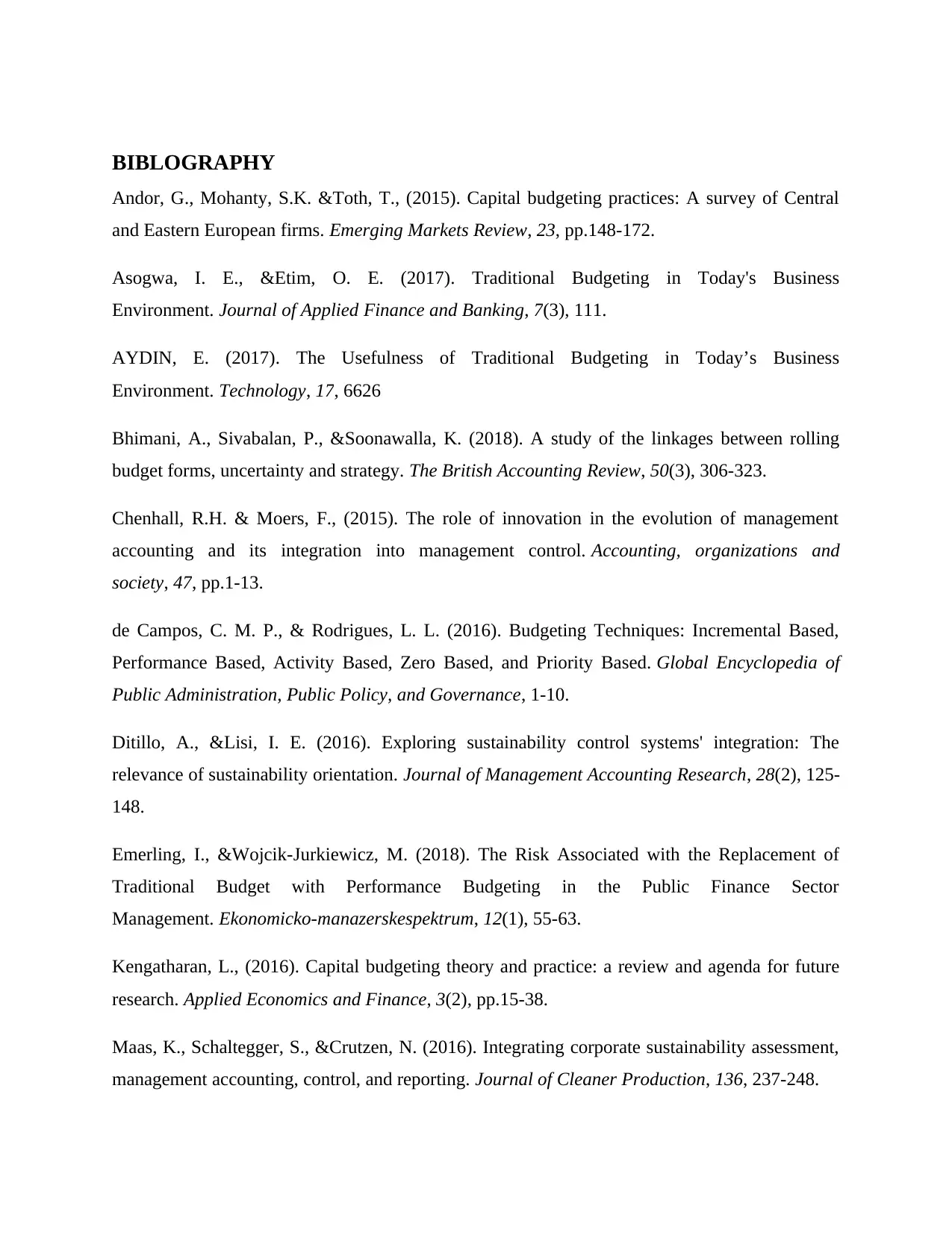
BIBLOGRAPHY
Andor, G., Mohanty, S.K. &Toth, T., (2015). Capital budgeting practices: A survey of Central
and Eastern European firms. Emerging Markets Review, 23, pp.148-172.
Asogwa, I. E., &Etim, O. E. (2017). Traditional Budgeting in Today's Business
Environment. Journal of Applied Finance and Banking, 7(3), 111.
AYDIN, E. (2017). The Usefulness of Traditional Budgeting in Today’s Business
Environment. Technology, 17, 6626
Bhimani, A., Sivabalan, P., &Soonawalla, K. (2018). A study of the linkages between rolling
budget forms, uncertainty and strategy. The British Accounting Review, 50(3), 306-323.
Chenhall, R.H. & Moers, F., (2015). The role of innovation in the evolution of management
accounting and its integration into management control. Accounting, organizations and
society, 47, pp.1-13.
de Campos, C. M. P., & Rodrigues, L. L. (2016). Budgeting Techniques: Incremental Based,
Performance Based, Activity Based, Zero Based, and Priority Based. Global Encyclopedia of
Public Administration, Public Policy, and Governance, 1-10.
Ditillo, A., &Lisi, I. E. (2016). Exploring sustainability control systems' integration: The
relevance of sustainability orientation. Journal of Management Accounting Research, 28(2), 125-
148.
Emerling, I., &Wojcik-Jurkiewicz, M. (2018). The Risk Associated with the Replacement of
Traditional Budget with Performance Budgeting in the Public Finance Sector
Management. Ekonomicko-manazerskespektrum, 12(1), 55-63.
Kengatharan, L., (2016). Capital budgeting theory and practice: a review and agenda for future
research. Applied Economics and Finance, 3(2), pp.15-38.
Maas, K., Schaltegger, S., &Crutzen, N. (2016). Integrating corporate sustainability assessment,
management accounting, control, and reporting. Journal of Cleaner Production, 136, 237-248.
Andor, G., Mohanty, S.K. &Toth, T., (2015). Capital budgeting practices: A survey of Central
and Eastern European firms. Emerging Markets Review, 23, pp.148-172.
Asogwa, I. E., &Etim, O. E. (2017). Traditional Budgeting in Today's Business
Environment. Journal of Applied Finance and Banking, 7(3), 111.
AYDIN, E. (2017). The Usefulness of Traditional Budgeting in Today’s Business
Environment. Technology, 17, 6626
Bhimani, A., Sivabalan, P., &Soonawalla, K. (2018). A study of the linkages between rolling
budget forms, uncertainty and strategy. The British Accounting Review, 50(3), 306-323.
Chenhall, R.H. & Moers, F., (2015). The role of innovation in the evolution of management
accounting and its integration into management control. Accounting, organizations and
society, 47, pp.1-13.
de Campos, C. M. P., & Rodrigues, L. L. (2016). Budgeting Techniques: Incremental Based,
Performance Based, Activity Based, Zero Based, and Priority Based. Global Encyclopedia of
Public Administration, Public Policy, and Governance, 1-10.
Ditillo, A., &Lisi, I. E. (2016). Exploring sustainability control systems' integration: The
relevance of sustainability orientation. Journal of Management Accounting Research, 28(2), 125-
148.
Emerling, I., &Wojcik-Jurkiewicz, M. (2018). The Risk Associated with the Replacement of
Traditional Budget with Performance Budgeting in the Public Finance Sector
Management. Ekonomicko-manazerskespektrum, 12(1), 55-63.
Kengatharan, L., (2016). Capital budgeting theory and practice: a review and agenda for future
research. Applied Economics and Finance, 3(2), pp.15-38.
Maas, K., Schaltegger, S., &Crutzen, N. (2016). Integrating corporate sustainability assessment,
management accounting, control, and reporting. Journal of Cleaner Production, 136, 237-248.
⊘ This is a preview!⊘
Do you want full access?
Subscribe today to unlock all pages.

Trusted by 1+ million students worldwide
1 out of 13
Related Documents
Your All-in-One AI-Powered Toolkit for Academic Success.
+13062052269
info@desklib.com
Available 24*7 on WhatsApp / Email
![[object Object]](/_next/static/media/star-bottom.7253800d.svg)
Unlock your academic potential
Copyright © 2020–2026 A2Z Services. All Rights Reserved. Developed and managed by ZUCOL.





